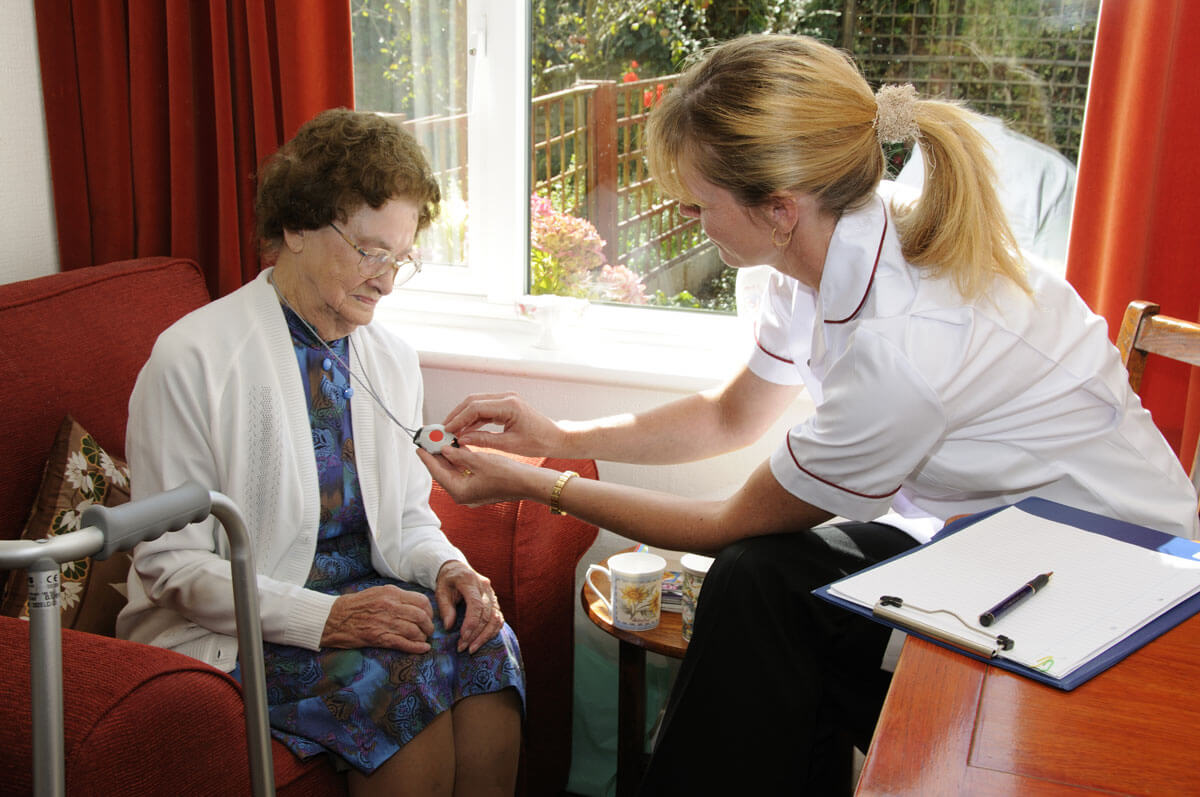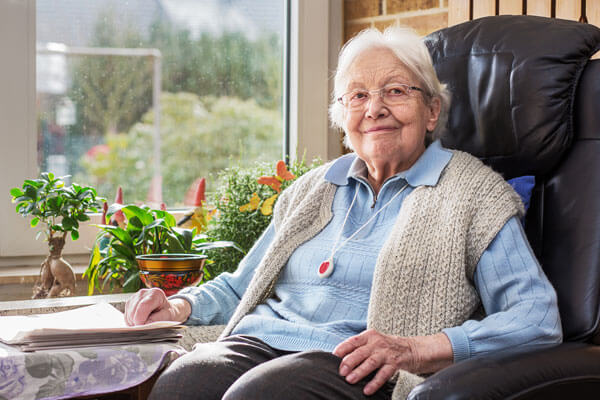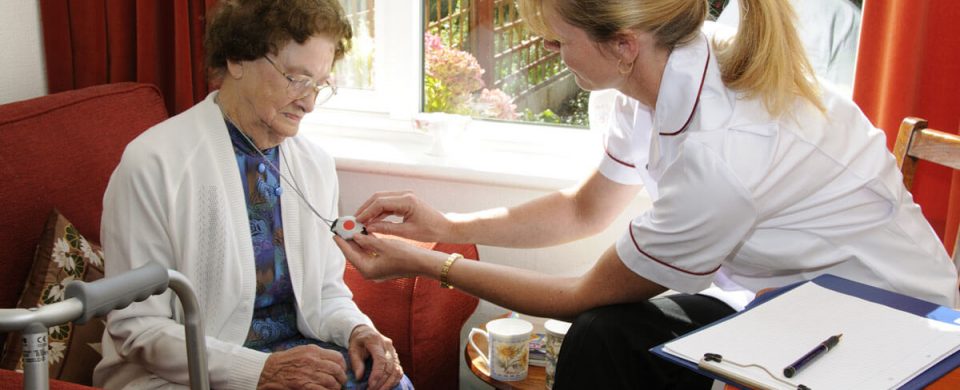
Everything to know about Home and Mobile Medical Alert systems

Whether your elderly parent is home all the time or still living an active lifestyle, there is a medical alert system that can help in an emergency.
Many Canadian seniors with a medical condition or disability continue to live independently, thanks to effective medical alert systems in the market.
Equipped with modern technologies such as fall detection and GPS monitoring, these devices make it easier for a senior to call for help with just a push of the button.
Do you have an aging parent living alone that you worry about? Compare the best medical alert systems for your loved one and have peace of mind.
Fill out the form on this page to get FREE and NO-OBLIGATION quotes from reputable panic button companies in your area.
How do medical alert systems work?
Medical alert systems are personal emergency devices that have a panic button that a user can press to call for help. It is like a personal 911 as it connects you to a monitoring center with trained specialists to assist you.
When you buy a medical alert system, it comes with a:
- Base unit
- Wearable panic button (bracelet, watch, or pendant)
Depending on the level of help required, the monitoring center can contact a loved one or designated contact or emergency services (fire, police, medical responders).
The wearable panic button can be worn around the wrist or around the neck. Some systems allow you to clip the panic button to a belt.
This is very convenient because you can sleep with it, use the bathroom, and basically have it on at all times. Many of these panic buttons are also waterproof or water-resistant.
With a medical alert system on your person, you can call for help when you feel sick, have an accident, or need assistance without dialing a phone. It is so easy; just one press of a button and help will come!
Who should use a medical alert system?

The U.S. Centers for Disease Control reports that 1 out of 4 seniors 65 and older can have at least 1 fall annually. The odds for a second or third fall increases after that. 1 in 5 falls leads to serious injuries like brain injury or broken bones that could make calling for help using a phone almost impossible.
Medical alert systems are designed to provide reliable emergency assistance for:
- Seniors living alone
- Seniors in assisted living facilities
- Individuals with medical or chronic conditions (Parkinson’s, Diabetes, Stroke, Epilepsy, Asthma, etc.)
- Individuals with mobility issues
- Individuals with a history or fear of falls
- Seniors suffering from Dementia, Alzheimer’s, etc.
- Individuals recovering from an illness or surgery
- Children with special needs
A medical alert system can help you keep your independence in your home. The cost is also very reasonable in exchange for monitoring services that can save the life of a loved one or yours.
Types of Medical Alert Systems
You can now find two general types of medical alert systems in the market:
- Home use
- Mobile
Depending on the company/provider, the system can be connected to a landline with a few providers able to connect to a cellular, cable, or VOIP for home coverage.
For mobile systems that provide protection in the home as well as outside the home, a cellular network is used.
Standard systems for home use are cheaper than mobile systems because the latter has more advanced features such as GPS tracking, fall detection, geo-fencing, etc.
The decision on which type of medical alert system is best for your loved on depends on whether the intended user is home most of the time or goes out unaccompanied. Active seniors will find a mobile system very useful while those at home can choose an in-home system that won’t need charging.
Home and Mobile Device Combination
Many companies offer home and mobile device combination systems. Seniors who are at risk for wandering or getting lost can be protected by a mobile device that will allow caregivers to track their location. A home-based system, however, will not stop working if the user forgets to charge the device.
Companies will have different names for this type of package such as Philips Lifeline Go Safe Package or LifeCall’s Advanced Mobile Plus.
Prices vary among companies so it is advisable to compare multiple offers before you choose. You can get started by filling out the form on this page to get free quotes.
How to choose a medical alert system for a loved one
In a report by the Public Health Agency of Canada, 256,011 older Canadians reported a fall-related injury in 2009-2010. Of these individuals, 63.6% were women while 54.3% were men. Most of them were aged 74 years old and below.
A fall or other type of accident is a big cause of concern for many, especially when they have a loved one living alone.
A medical alert system- also called a panic button or personal emergency response system (PERS)- is a good way to increase independence and peace of mind.
The AARP recommends the use of medical alert systems to care for seniors aging at home. They suggest choosing a medical alert system by looking into the following considerations.
- What do you require from a medical alert system?
The medical alert systems available in the market today have many options. They usually come with a panic button (fixed or wearable), fall detection, medication reminder, and GPS tracking. You can also choose a monitored system (connected to a professional monitoring center) or a non-monitored one (sends an alert to a designated contact like a family member).
- What kind of device will be convenient for the user?
Wearable devices that are worn like a bracelet or pendant are convenient and comfortable. It is also important to consider connectivity (don’t choose a wireless or cellular system if the signal in your area is poor), battery life, and ease of installation or set-up. Some systems also require a landline.
- Who monitors the system and takes calls?
The efficiency of a medical alert system or panic button depends largely on who monitors and takes emergency calls. Check on the company’s customer service and reputation, their response time (it is measured in seconds) and their language (English, French, etc.) Many monitoring centers have multi-lingual or bilingual agents to serve their customers.
- What is the cost of the medical alert system?
Not all medical alert systems cost the same. In fact, their prices vary in terms of price for the device and monthly monitoring fee. Compare and choose based on overall value of the offer and don’t go for the cheapest price in the market.
Generally, you will pay for the device (one-time purchase), monthly monitoring fees which range from $25 to $60 a month, and activation fees.
If you already have a home security system, check if the provider has a medical alert system, too. It is also important to know if the company has national coverage in case the user has to move to another location in the future.
- Is there a long-term contract?
It is also important to check the length of the contract for monitoring. Some don’t require a contract while others have 24 to 36 months required commitment.
A medical alert system can also be combined with private home care for elderly persons who want to age in their homes. This combination can be a very effective and convenient way to take care of a loved one.
A Glance at top medical alert systems in Canada
If you are doing your research on medical alert systems in the market, below are some of the top choices in Canada.
SecurMedic | Global Security | Direct Alert | Philips Lifeline | |
|
|
|
|
|
|
|
|
|
|
|
|
| None |
|
|
|
|
|
|
|
|
|
|
|
|
lifetime guarantee |
|
|
|
|
|
|
|
|
|
|
|
|
|
These are but some of your choices for your loved one. You can compare actual quotes by filling out the form on this page, free of charge!
Panic Buttons for Seniors with Alzheimers’ or Dementia
About 60% of seniors with dementia wander and will be incapable of remembering important information such as a telephone number or address. Medical alert devices can help family members to locate their loved ones should they get lost. Most importantly, these devices will send an alert to a monitoring center that will immediately notify authorities to send help.
Look for the following features in a medical alert system for seniors with memory impairment:
GPS Tracking: Location tracking technology with cellular services and GPS provide the user’s location accurately, allowing responders to provide immediate assistance.
Geofencing: This feature especially benefits seniors who wander. Set-up safe zones for your loved one and be alerted when they leave the safe area.
Fall detection: Fall detection is an additional option for medical alert systems. A monitoring center is alerted that the user has fallen and may need assistance.
With these special capabilities, a situation wherein the senior wanders alone for hours or is on the floor, possibly hurt or unconscious for hours, is averted.
Medical alert systems for independent living

About 75% of Canadian seniors today prefer to live at home, independently, and without constant care. But not having someone around 24/7 can be worrisome, especially for someone with a history of falls or with impaired mobility. Statistics show that an elderly adult is treated at an emergency room due to a fall-related injury every 11 seconds.
Panic buttons help make aging at home possible, even if there is no 24/7 caregiver on hand. Those looking for the best device for a loved one can consider the following features:
Automatic Fall detection: A device with an automatic fall detection will alert a monitoring center even if the user fails to push the panic button. This can be a life-saver in the event the user becomes injured, unconscious, or disoriented after a fall.
Wall Panic Button: This feature is offered by some providers and can help connect the user to the monitoring center without pressing the button. This can be a great add-in for situations when the user is not wearing the device.
Medication reminder or dispenser: Some medical alert systems offer this feature. It is helpful for users with prescription medications they need to take at specific times.
Activity Monitoring: Some systems have their own platform that caregivers can use. Sensors can detect a change or lack of activity and send an alert that something may have happened.
As you can see, technology is wonderful in assisting seniors to remain independent. Because these systems come with wearable panic buttons that have attractive designs, they are comfortable, unobtrusive, and very easy to operate.
Add-ons offered by Medical Alert Systems
Medical alert system companies want to give as much convenience and security to their customers so they offer additional features at a reasonable price. Below are some popular ones you can consider.
Lock Box
Some providers offer a secure lockbox that stores a key to your home that emergency responders can use. Aside from preventing damage to a door or window, it allows responders to enter the home faster.
Second Button
Some providers also provide a second panic button for an additional cost. This means a spouse can also have a panic button under the same account. The price of a second button is reasonable.
How to talk to a loved one about a medical alert system
It is not uncommon for seniors to balk at using a medical alert system. Understand that using such a device reminds them of their frailty and lack of independence. Tact and understanding are both critical when suggesting a medical alert system to a loved one.
Explain the benefits of a medical alert system
It is best to start by explaining the benefits of a medical alert system. Many of them have sporty and sleek buttons that can be worn as a pendant or watch and have features such as 2-way voice communication, messaging, etc.
It is also important to explain how a panic button can help during an emergency with one simple push of the button. Emphasize that it can allow them to confidently remain at home alone without being at risk.
Keep in mind that seniors may need time to consider getting a medical alert system. Listen to their concerns, especially when they worry about the cost. Focus on explaining how the system can protect them and help them remain independent without causing anxiety to family members.
Most importantly, explain how to use the system and answer their questions.
Frequently asked Questions about Medical Alert Systems
Choosing the best medical alert system will require understanding your different options and comparing products. Below are frequently asked questions about medical alert systems that can help you to choose wisely.
What should I look for in a medical alert system?
It is important to choose a system that is highly-reliable and easy to install and use. The best companies have UL Certified monitoring centers with trained emergency response personnel available 24/7.
Why are prices of medical alert systems so different from one another?
Just like most products, medical alert systems are not equal. They use different technologies and may vary in features. Some may have lower monthly monitoring fees but others may offer additional services such as unique platforms for caregivers, auto fall detection, medication reminders, etc.
What emergencies can a medical alert system be used for?
Medical alert systems are designed for medical emergencies but they can also be used even for other types of emergencies. For example, a user can push the button if he needs a relative to be contacted because he cannot get to the phone. He can also push the button in case of a fire or if the police need to be contacted. As you can see, a medical alert system can be useful for any type of emergency.
Do I need automatic fall detection?
If you subscribe to a basic plan, you are required to push a panic button to summon help. Falls are very common among the elderly and in some cases, they are unable to press the button for help. In this scenario, automatic fall detection will ensure that the monitoring center is alerted about a possible fall, even when the user fails to push the panic button.
If you have experienced a fall in the past or you are at risk of falling, you need automatic fall detection.
Does health insurance cover medical alert systems?
Unfortunately, the public health insurance plan does not cover the cost of medical alert systems. You can ask your private health insurance whether they cover the cost as insurers have different policies.
Is there a charge when the help button is pressed?
No, companies won’t charge for pressing the panic button. The service is already included in the monthly fee.
Can a user cancel emergency help if the panic button is accidentally pressed?
Yes, some systems have an automatic cancel feature when the user presses the button again within a time frame. But they also follow a simple verification procedure when the button is pressed. The 2-way voice communication system allows the user and the monitoring center to speak.
What is the average response time after a panic button is pushed?
Within 45 seconds or less, a monitoring center is able to provide the appropriate response, depending on the emergency situation. They will contact the police, fire department, or medical responders to assist within seconds.
Can family members be emergency responders?
Yes, the monitoring center automatically alerts designated family members when there is an emergency. If it is not a medical or police matter, the account can have several personal contacts as responders such as when the user just needs help with supplies, getting dressed, or going to the bathroom.
Is there a cancellation fee to cancel the service?
It depends. Some medical alert systems can be canceled any time while others require lock-in periods which could be 24 to 36 months.
How to find the best medical alert system for the right price
Now that you know how important a medical alert system can be for the safety and security of your loved one, it is time to find the right system for you.
You can compare several medical alert systems that service your area by simply filling out the short form below. You will receive FREE and NO OBLIGATION quotes to choose from.
Our panic button partners are leaders in the industry and have partnerships with UL Certified monitoring centers for reliable services. They also offer the most competitive prices that suit your budget.
Save time and money by comparing the best medical alert systems
with emergency panic buttons near you!
Comments are closed.

Copyright© 2026 Compare Home Quotes.
Oolong Media






